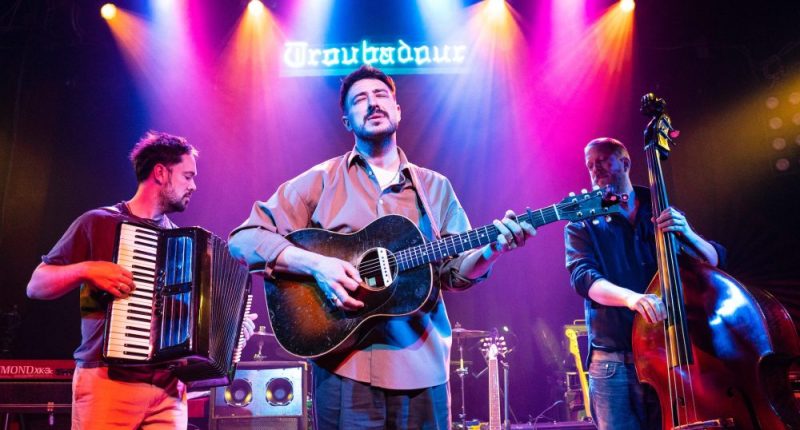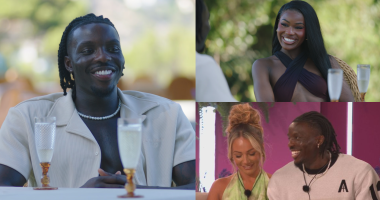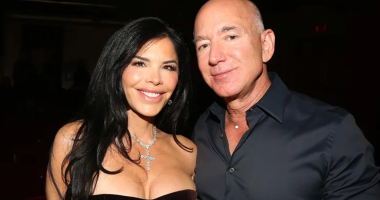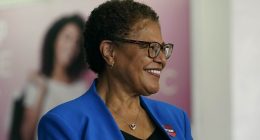How is it that the Americana Music Association has been holding annual Grammy eve tribute shows at the Troubadour since the mid-2010s, but never got around, until this year, to feting Lucinda Williams — of whom AMA director Jed Hilly said, “You are the voice, you are the songs, you are the soul of Americana”? Probably only because Americana is the rare field of music that typically takes care of or at least looks to its elders first, and so previous shows in the series focused on artists with more tread on their tires, like Willie Nelson and, before they both passed, Loretta Lynn and John Prine. But Williams is the ultimate recipient of the kind of salute thrown for her Saturday at the Troubadour — a little over two solid hours of passionate kisses blown right at her, as she watched the Mandolin livestream from home.

The predominantly female cast included lead turns from two of this year’s Grammy winners — Molly Tuttle, who won best bluegrass album (and was up for best new artist) and Madison Cunningham, a winner for folk album — plus Dwight Yoakam, Mumford & Sons, Allison Russell, Lucius, Brandy Clark, Sierra Ferrell, Grace Potter, Best Coast’s Bethany Cosentino, Jade Bird, Sara and Sean Watkins, the Milk Carton Kids, Lori McKenna, Aoife O’Donovan, Brittney Spencer, Katie Pruitt, Abraham Alexander and Charlie Hickey.
Introducing the next-to-last number, Yoakam spoke to the individuality of Williams’ music, or at least one famous friend’s insistence on it. “I got in a big fight with Don Imus, the radio personality, over this song,” said Yoakam, who was asked to contribute a tune to a charity project. “I called him and said I want to do Lucinda Williams’ song, ‘Changed the Locks.’ and he said [barking], ‘No! You’re not doing that!’ i said, why? ‘You’re gonna do what I told you to do, that’s why!’ I said, ‘Well, I really want to do Lucinda’ song.’ He said, ‘Nobody can do that but Lucinda Williams! So shut up and do the one I told you to do!’ And after hearing me do it, you may agree.” But, he added, “every Lucinda Williams song that I’ve ever heard, I learned more about the honesty of songwriting and what it can convey.”

And yet — maybe not the first or last time in his life, Imus was wrong. As much as it may be hard to hear Williams’ songs in your head when you’re just trying to imagine them without her distinctive drawl spread across them, they’re surprisingly transmutable in the execution, by the right artist… and everyone booked for the Americana Association’s show was the right artist. Just as Tom Petty had his own way with “Changed the Locks” back in the ’90s, it survived Yoakam’s more hard-charging and rocking approach just fine. And on the ballads, like “The Night’s Too Long,” a Brandy Clark was able to make it sound like she, not Williams, had discovered — and possibly identified with — the song’s company-craving Beaumont waitress.
In other words, writing all these eminently cover-able songs, Williams didn’t put any kinds of locks on to katy-bar the doors against all the interpreters that’ve inevitably been drawn to her, from Mary Chapin Carpenter having a top 10 country hit with “Passionate Kisses” in 1992 up through Saturday night.

ERIKA GOLDRING
A highlight of the night, by near-universal acclamation, was a duet of signature song “Car Wheels on a Gravel Road” by two of the most phenomenal young artists in Americana, Sierra Ferrell and Allison Russell. The latter singer, a native of urban Canada, may not have heard quite as many unpaved driveways in her time as Williams, but her singing the stern parental lines about “When I get back, this place better be picked up” perhaps had a little extra resonance for anyone who’s heard Russell sing accounts of her own childhood. Ferrell, a West Virginia native who flirts with bluegrass, brought the tune closer to the originator’s own twang, and added a high harmony part to the chorus that sent the song out of the sticks and into liftoff.
The show had other terrific pairings where two were considered better than one in living up to Williams’ originals, as when Grace Potter joined forces for a show-opening slow-burner with Brittney Spencer, a Nashville artist who recently signed a mainstream country deal after being seen as a pinch-hitter sitting in with the Highwomen and others. Together, they found the witty, flickering soul of “I Lost It,” the 1980s track in which Williams seemed to be riffing on the evangelistic “I found it!” stickers of the ’70s that were finally peeling off bumpers around that time.
Potter later reappeared to match voices with the conjoined-twin harmonies of Lucius. (All of them were wearing variations on orange-and-blue suits that, as it turned out, at least per their claims, were coincidentally bought in the same shop on unrelated visits. The universe, quite clearly, wants Potter to join Lucius.)
One of the more surprising appearances in a night that did not advertise any artists in advance was by Mumford & Sons, acting as a banjo-less trio (just as they had the previous night at the MusiCares dinner, where they covered the Barrett Strong hit “Money”) and now taking on Williams’ “World Without Tears.” The cameo was tipped off to attentive audience members by Marcus Mumford hitting the floor of the Troubadour about halfway through to watch the show, rather than stick with the hang backstage. “I’ve been so fucking mesmerized, I didn’t tune my guitar,” Mumford admitted, as the trio proceeded to do something they definitely did not attempt at the black-tie dinner in the cavernous L.A. Convention Center the previous night: singing and playing without amplification. Keeping it low-volume was somehow kind of fitting for one of Williams’ most poignant expressions of pure, universal pain. Ostensibly justifying sorrow having its place in life, the song asks, “If we lived in a world without tears, how would bruises find the face to lie upon?” (We see what you did there, Lucinda.)
Another song that touched on anguish, albeit with less searing irony, was “Are You Alright?,” a song that again and again asks the titular question of a troubled friend, maybe in hopes that that person will not end up headed toward a premature death like the subjects of “Drunken Angel” or “Sweet Old World.” The Milk Carton Kids set aside their trademark between-songs humor to make “Are You Alright?” as quietly heartbreaking as it needs to be — and their pitch-perfect harmonies showed that nothing need be lost when Williams’ raspier, twangier tones are replaced by something purer.
Most of the night’s roster was known to Americana aficionados, but the lineup included two lesser-knowns who both just happened to be among the few men participating as lead singers, Charlie Hickey and Abraham Alexander. The latter artist, kicking a bass drum as well as playing an electric guitar, found an even bluesier and tenser spin to put on Williams’ “West Memphis,” prefacing it with a note about the added meaning the tune could — and did — take on in the wake of the outrage currently rising up in that city.
Other standout turns ranged from Russell taking the spotlight on her own with “Fruits of My Labor,” getting in one of her now-famous clarinet solos, to Katie Pruitt’s picture-perfect take on the impossibly tender “Something About What Happens When We Talk.” But as anyone who was watching at home via the Mandolin livestream would likely attest, it was a no-skips setlist. The smart matchups of singer and song by show producer Michelle Aquilato made the most of the tunes’ possibilities, but even lesser singers might make a Williams tribute feel essential. Throughout her entire 44-year recorded catalog, there’s always been something about what happens when she writes.
Post source: variety
Last Updated on February 28, 2023 by 247 News Around The World











